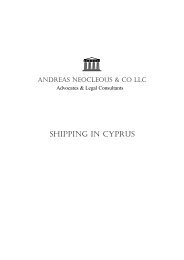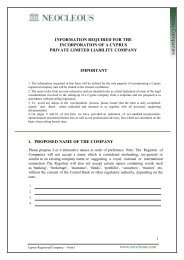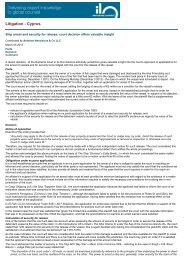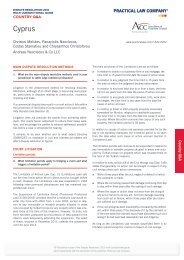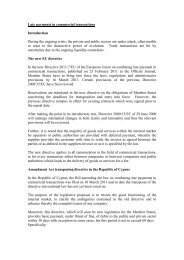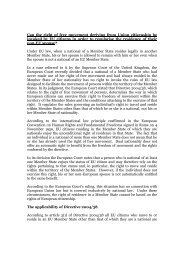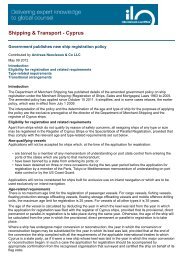Cyprus - Andreas Neocleous & Co
Cyprus - Andreas Neocleous & Co
Cyprus - Andreas Neocleous & Co
Create successful ePaper yourself
Turn your PDF publications into a flip-book with our unique Google optimized e-Paper software.
CYPRUS<br />
CYP/3<br />
power to bind his principal by contract and by acts connected with the<br />
performance of a contract, or he may have power to receive property for his<br />
principal or make a valid disposition of his principal's property. Similar<br />
reasoning may appear in areas such as torts or evidence.<br />
The legal doctrines that have developed can be divided into two broad<br />
categories. The first category relates to the agent's power to bind his principal<br />
and is of great importance to third parties dealing with such agents. The second<br />
category concerns the rights and liabilities of the principal and the agent inter se<br />
and imposes fiduciary duties on the agent, and regulates his rights to<br />
remuneration and indemnity. The first category concerns the external aspects of<br />
agency, whereas the second regulates the internal aspects of agency.<br />
Where the agent's authority results from a manifestation of consent that he<br />
should represent or act for the principal, expressly or impliedly made by the<br />
principal to the agent himself, the authority is called actual authority, express or<br />
implied.<br />
Where the agent's authority results from such a manifestation made by the<br />
principal to a third party, the authority is called apparent authority. 1<br />
Section 147 of the <strong>Co</strong>ntract Law provides that implied authority may be inferred<br />
from the circumstances of the case. Any written or oral evidence or the usual<br />
business practice may be regarded as circumstances of the case. As a result, the<br />
agreement between agent and principal need not be contractual. An agent can<br />
act gratuitously. The consent may also be given subsequently by ratification.<br />
<strong>Cyprus</strong> law recognizes seven categories of agents:<br />
General Agent<br />
A general agent has authority to act for his principal in all matters concerning a<br />
particular trade or business, or to do some act in the ordinary course of his trade,<br />
profession or business, for example, as a solicitor or factor.<br />
Special Agent<br />
A special agent is an agent who has authority only to do some particular act or to<br />
represent his principal in some particular transaction not being in the ordinary<br />
course of his trade, profession or business as an agent.<br />
Sub-Agent<br />
A sub-agent is defined under section 151 of the <strong>Co</strong>ntract Law as 'a person<br />
competent to contract, employed by and acting under the control of the original<br />
agent in the course of business of the agency'.<br />
Section 152 provides that if a sub-agent is properly appointed, the principal is,<br />
as far as third parties are concerned, represented by the sub-agent and is bound<br />
1 Bowstead on Agency, 14th Edition.<br />
(Release 2 – 2013)




